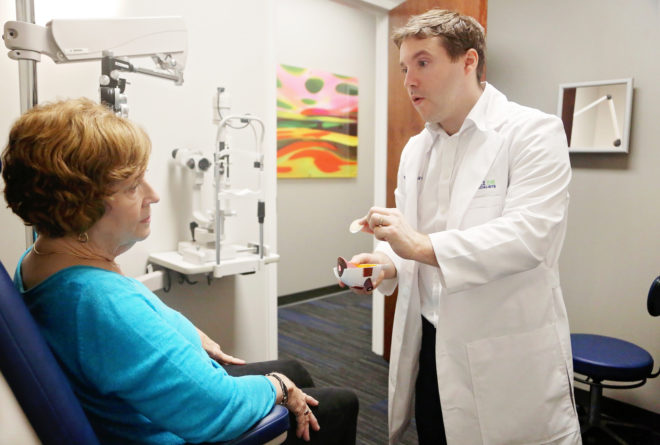
It may seem like everyone around you is getting laser surgery these days! All-laser LASIK eye surgery is extremely popular. However, LASIK does not fix all eye or vision issues. Continue reading to find out exactly what LASIK surgery corrects - and what it does not.
LASIK surgery corrects refractive errors, which affect how the eye focuses light. A healthy eye correctly bends light coming into it, whereas an eye with a refractive error has difficulties doing so, resulting in blurred vision. Refractive errors stem from the way the eye is shaped or structured, rather than being an eye disease.
Myopia, also known as nearsightedness, occurs when you CAN see near but cannot see far away. Nearsightedness is extremely prevalent and has been on the rise for the past several decades. Glasses or contacts with a minus (-) prescription correct nearsightedness. EVO ICL, PRK and LASIK surgery can all correct nearsightedness with the potential to eliminate the need for glasses and/or contacts.
Hyperopia, also known as farsightedness, occurs when you CAN see far away but you cannot see near. About 25% of the population has hyperopia. If you are farsighted, then your prescription will have a plus (+) in front of it. Both PRK and LASIK surgery can correct farsightedness with the potential to eliminate the need for glasses and/or contacts.
Astigmatism typically results in blurred vision at all distances. One of the biggest misconceptions about LASIK is that LASIK cannot correct this type of refractive error. In reality, EVO ICL, PRK and LASIK surgery all can correct astigmatism in most patients, and we have been doing so for over a decade.
According to BetterVisionGuide.com, Presbyopia is the normal loss of near-focusing ability that occurs with age. Most people notice the effects of presbyopia sometime after age 40. This can be very frustrating, especially for people who have had perfect vision their whole life. The good news is both PRK and LASIK can correct presbyopia thanks to monovision. Monovision is a very effective outcome for providing patients with great usable vision at all distances without being dependent on reading glasses
Also known as lazy eye, amblyopia is muscle-related and typically found in children. LASIK is still a possibility if you have amblyopia – however, LASIK will only allow you to reach your best-corrected vision, which is the vision you can attain with glasses or contacts.
Cataracts are typically found in people who are over the age of 60 and make your vision cloudy or foggy. Cataracts are a disease of the lens, and as such, LASIK will not correct this condition. If you have a cataract, you should be monitored by a cataract specialist, to determine when cataract surgery would be appropriate. If vision correction is still required after cataract surgery, LASIK may be a possibility.
According to the National Eye Institute “Glaucoma is a group of diseases that damage the eye’s optic nerve and can result in vision loss and blindness. However, with early detection and treatment, you can often prevent serious vision loss.” If you have glaucoma, a glaucoma specialist should carefully monitor your eyes and condition. If your glaucoma is under control, LASIK may be an option, however, please be aware that LASIK does not treat glaucoma itself – rather, it only improves vision.
According to the American Academy of Ophthalmology “Keratoconus is when the cornea thins out and bulges like a cone. Changing the shape of the cornea brings light rays out of focus. As a result, your vision is blurry and distorted, making daily tasks like reading or driving difficult.” If you have keratoconus, you should not have LASIK, PRK or EVO ICL surgery, as it can exacerbate the situation. A cornea specialist should monitor your vision and keratoconus for treatment with corneal crosslinking when appropriate.
If you are interested in correcting your refractive error, whether it be nearsightedness, farsightedness, presbyopia or astigmatism, you should always be thoroughly evaluated by an expert vision correction surgeon. There are dozens of ocular and whole-body health factors that must be taken into consideration before determining if LASIK, EVO ICL or PRK surgery is right for you.
Take the first step towards seeing more and living better by scheduling your FREE consultation at Providence Eye.